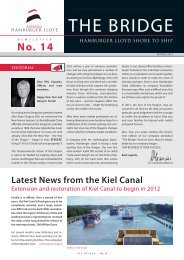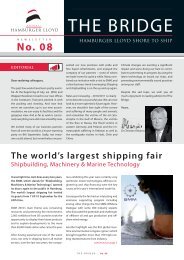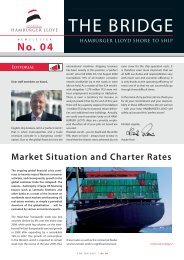Read whole article (PDF) - RHL | Reederei Hamburger Lloyd
Read whole article (PDF) - RHL | Reederei Hamburger Lloyd
Read whole article (PDF) - RHL | Reederei Hamburger Lloyd
Create successful ePaper yourself
Turn your PDF publications into a flip-book with our unique Google optimized e-Paper software.
Hamburg to become bonded seaport<br />
Termination of Hamburg’s free-port status as from January 1 st 2013<br />
On December 31 st 2012, the Hamburg<br />
Senate “Law of the Termination of the<br />
Free-Trade Zone” will come into effect.<br />
In the interest of port development and the<br />
autonomy of urban planning, the free-port<br />
status will be lifted after almost exactly 125<br />
years. Subsequently, the EU directives for<br />
Bonded Seaports will apply for Hamburg’s<br />
entire port area.<br />
What does this mean for port-related companies?<br />
Hamburg’s free-port area is a free-trade<br />
zone, and will continue to be one up until<br />
January 1st 2013. Free-trade zones are<br />
enclosed by border fences with customs<br />
checkpoints. This kind of custom-free area<br />
serves to facilitate storing, processing and<br />
refining of imported merchandise: Since the<br />
goods are not considered to be within the<br />
EU customs area for the duration of their<br />
storage, no tolls need to be paid for them.<br />
So far, companies have been able to store<br />
seaborne goods duty-free within the freetrade<br />
zone, without time limitation, and<br />
declaration-free. Yet with the termination<br />
of the free-trade zone, companies in contact<br />
with community goods – these are goods<br />
which were won and/or produced within<br />
the area of the EU customs union, e.g. a<br />
bicycle built entirely in Germany – will no<br />
longer need to account for or register the<br />
community status of these goods, which<br />
is a European free-port necessity. This will<br />
mean facilitated processing and clearance.<br />
The discontinuation of customs inspections<br />
of empty and through traffic will also be<br />
advantageous, since the checkpoints will<br />
be removed and the former borders crossed<br />
without restrictions.<br />
With Hamburg’s conversion to a bonded<br />
seaport, duty-free storage will still be avail-<br />
able for all goods, yet only for a maximum<br />
duration of 45 days. Before this period ends,<br />
companies have to decide whether they<br />
want or need to hold merchandise from<br />
third-party countries available for longer.<br />
If an extension of storage time is deemed<br />
necessary, or in the case of further processing<br />
of the goods, specific legal procedures<br />
such as customs warehousing or active<br />
processing traffic need to be applied for<br />
at the Main Customs Office. Concerning<br />
customs laws and regulations of this kind,<br />
the companies will need to assume much<br />
more responsibility in the future.<br />
In free-port storage, it has so far been<br />
possible to treat and process goods in ways<br />
typical for customs warehouses, like labelling<br />
or packaging them. In a bonded seaport,<br />
these activities exceed the permissible<br />
conservation treatment. If goods are to be<br />
modified in appearance, in preparation for<br />
sale by retail, their status has to be changed<br />
via a customs procedure with economic<br />
significance (e.g. customs warehousing)<br />
before they can be commercially cleared.<br />
In order for a company to fulfil these new<br />
requirements, they will have to adapt<br />
some of their operational procedures.<br />
Hamburg’s Bureau for Economy, Traffic<br />
and Innovation (“Behörde für Wirtschaft,<br />
Verkehr und Innovation”, BWVI) has introduced<br />
two promotional programmes to aid<br />
companies in this new situation.<br />
THE BRIDGE I No. 16<br />
The programme “Modernisation of Customs<br />
Declarations” (“Modernisierung Zolldeklarierung”)<br />
offers financial support for companies<br />
in need, for example, of technical<br />
resources to help adapt their accounting<br />
and customs declarations to the new<br />
regulations (IT solutions), or maybe of constructional<br />
investments for customs safety<br />
reasons.<br />
The programme “Qualification Bonus –<br />
Customs Sector 2013” („Weiterbildungsbonus<br />
Zoll-Landschaft 2013“) financially supports<br />
personnel qualification, to help the<br />
companies adapt to all aspects of the new<br />
customs environment as from 2013.<br />
What does this mean for ships – and their<br />
crews – entering Hamburg?<br />
<strong>RHL</strong> Flottbek und <strong>RHL</strong> Barmbek passing under the “Köhlbrandbrücke”, in the current free-port area<br />
Until the end of 2012, ships entering the<br />
free-trade zone from sea do not have to<br />
report or prepare a declaration. Also, lists<br />
of the ship’s, crew’s and any passengers’<br />
supplies, provisions and personal effects<br />
only need to be held available on board. As<br />
from January 1st 2013, however, generally<br />
all commercial ships must report to the Port<br />
Authorities and send those same lists in<br />
advance, via the relevant forms.<br />
Bettina Pane<br />
Sources: http://www.aeb.de/multi-media/de/docs/fachartikel/<br />
aw-prax-05-12-seezollhafen-hamburg.pdf, http://www.hamburg.<br />
de/aufhebung-freihafen/






